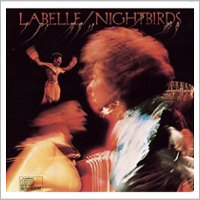By Mick Dumke
At one time, “Lady Marmalade” was unquestionably one of the great tracks from the ’70s: a sexy, four-minute funk party with a hot streetwalker whose lovers just can’t stop thinking about her or her come-on line: “Voulez-vous coucher avec moi ce soir?” But if you actually really listen to “Lady Marmalade,” you’ll sense that this character and her story are also fleeting and sad.
 These days, the whole song is kind of fleeting and sad, because it’s one of many once-terrific singles that have been overplayed by Oldies radio programmers and included in too many bad movies or Democratic political campaigns – just like “Lean on Me,” “You Are the Sunshine of My Life,” “More Than a Feeling,” and “Don’t Stop (Thinking About Tomorrow).” Still, these are great songs, especially when placed in the right context.
These days, the whole song is kind of fleeting and sad, because it’s one of many once-terrific singles that have been overplayed by Oldies radio programmers and included in too many bad movies or Democratic political campaigns – just like “Lean on Me,” “You Are the Sunshine of My Life,” “More Than a Feeling,” and “Don’t Stop (Thinking About Tomorrow).” Still, these are great songs, especially when placed in the right context.
Context matters. Consider the ongoing example of politicians who are also liars. Nixon may have lied, but he sure did cheat. Yet even Nixon occasionally talked about social justice. Ford probably lied, but no one seems to remember anything he did or said, while Reagan really didn’t lie, because he couldn’t remember anything he did or said. In between, Carter probably lied, and probably should have lied a lot more. The first Bush undoubtedly lied, but he’ll mostly be remembered for yakking on the Japanese prime minister and siring a son who wasn’t interested in learning anything and simply got others to lie for him. Clinton lied, too, but the comparison with his successor has made many people wish he were back in office lying to the American people all over again.
They were all liars, but the context changed, and we’ve decided to remember them all differently. In other words, a healthy tension exists between universal laws and situational ethics; between the constant and the constantly changing; between the idea that a few glasses of wine over dinner with friends is always a good plan and the idea that drinking out of the bottle with the company of your cats is a special night; between songs stolen by marketing people and used as advertisements and songs that make up album cycles about pain, lust, fantasy, drugs, spiritual searching, music and politics – the joys of life.
All of the great, overplayed songs of the ’70s can still approach perfection at certain moments – especially “Lady Marmalade,” and especially when it’s heard within the rest of the amazing Nightbirds record. In the early-to-mid 70s, as Nixon was burying himself under layers of lies, Patti LaBelle, Nona Hendryx, and Sarah Dash began dressing up, like Bowie, in what appeared to be discarded costumes from the set of Barbarella – not that Jane Fonda wore much of a costume, or anything else, in that movie. Think about it, though – Barbarella might not be the one of the greatest all-time sci-fi movies, but under certain conditions, it’s probably one of the greatest sci-fi movies to try to watch.
LaBelle’s old record jackets are similarly fun to try to figure out. The three singers look like they are ready to board their own spacecraft and rocket away from this world of rigid thinking and factory-produced R&B. But when you play the records, especially this one – which was released within a few weeks of Nixon’s resignation – something else emerges: a danceable, haunting story collection that happens to be told through an excellent mix of ’70s R&B, rock, gospel and New Orleans funk. After “Lady Marmalade” has come and gone, they sing, “Somebody somewhere will hear our cry for freedom,” and after that, “Are you lonely?” The beats and basslines, many provided by The Meters, are full of passion, anxiety, and defiance; yet while some songs (“Don’t Bring Me Down”) signal rebellion, others (“It Took a Long Time”) promise salvation or hope for peace (“Nightbirds”).
The album ends with “You Turn Me On,” a song about passion and loss that, in the best soul tradition, could be directed at God as well as a departed lover. It is so wistful and so deeply felt that it becomes beautiful and promising all over again. Is this Lady Marmalade singing? One of the lost voices who cried out for freedom earlier on the album? A citizen tired of lying and war? Some other neglected soul looking for release? Or simply a jilted lover? It depends on how and when you hear it, and who you are when you do.
Posted on November 27, 2006


